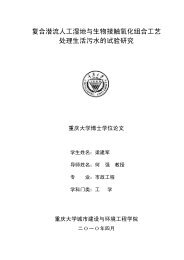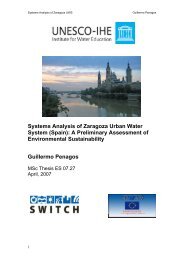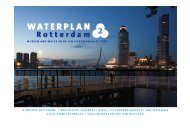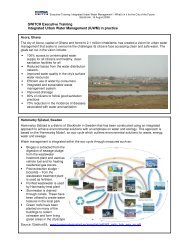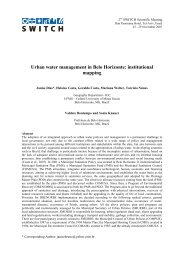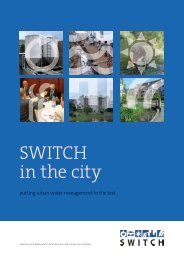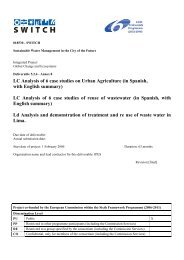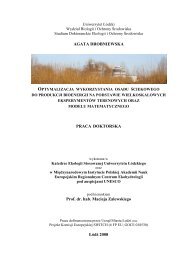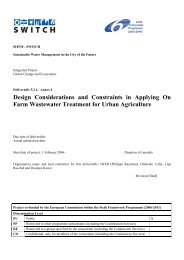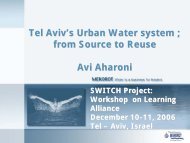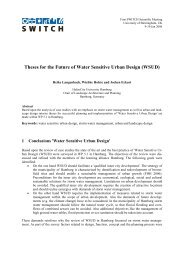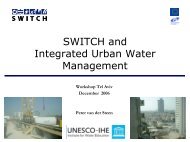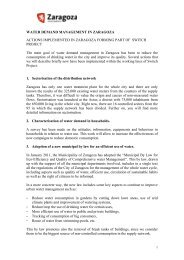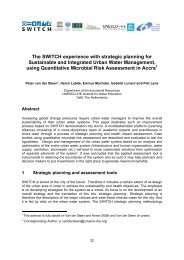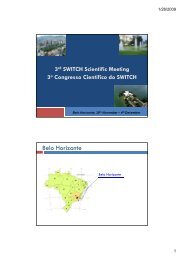Good practices for Social inclusion - Case studies and summary
Good practices for Social inclusion - Case studies and summary
Good practices for Social inclusion - Case studies and summary
Create successful ePaper yourself
Turn your PDF publications into a flip-book with our unique Google optimized e-Paper software.
Introduction <strong>and</strong> Background<br />
Introduction<br />
EMPOWERS st<strong>and</strong>s <strong>for</strong> Euro-Mediterranean Participatory Water Resources Scenarios. The<br />
project aimed to improve the health <strong>and</strong> livelihoods of people who are most marginalized in<br />
their access to fresh water through better management of water resources. EMPOWERS<br />
developed <strong>and</strong> tested approaches, methods <strong>and</strong> tools to involve poor <strong>and</strong> otherwise<br />
marginalised groups. The underlying goal was to achieve more sustainable, efficient <strong>and</strong><br />
equitable access to <strong>and</strong> use of water resources.<br />
The project had four specific objectives:<br />
− Increasing the influence of stakeholders -particularly the poorest <strong>and</strong> most<br />
marginalized- on the planning <strong>and</strong> decision making process <strong>for</strong> the use <strong>and</strong><br />
management of water resources.<br />
− Enhancing vertical <strong>and</strong> horizontal linkages <strong>and</strong> in<strong>for</strong>mation flows between water<br />
stakeholders.<br />
− Demonstrating effectiveness of the approach through pilot projects.<br />
− Documenting the learning process.<br />
EMPOWERS developed its approaches <strong>and</strong> tools <strong>and</strong> tested them through pilot projects in<br />
the three different locations (Table 6)<br />
Table 6: Empowers locations<br />
Country <strong>and</strong> governorate<br />
Jordan (Balqa Governorate)<br />
Palestine (Jenin Governorate)<br />
Egypt (Ihnazia Districtin Beni Suef<br />
Governorate)<br />
Selected communities<br />
Damya, Rweiha <strong>and</strong> Subeihi<br />
Jalboun, Arraneh <strong>and</strong> Qabatya<br />
Kassab, Masharqa <strong>and</strong> Maseed<br />
EMPOWERS was led by CARE International (an independent humanitarian organisation)<br />
<strong>and</strong> mainly funded through the European Union's MEDA (Euro-Mediterranean) Water<br />
Programme <strong>for</strong> Local Water Management. Other funding agencies were CARE International;<br />
International Water <strong>and</strong> Sanitation Centre <strong>and</strong> Personnel Services Overseas (PSO) 82 .<br />
Fifteen organizations collaborated on the project facilitation <strong>and</strong> implementation:<br />
In Egypt: Development Research <strong>and</strong> Technological Planning Center (DRTPC), Cairo<br />
University; Center <strong>for</strong> Environment <strong>and</strong> Development <strong>for</strong> the Arab Region <strong>and</strong> Europe<br />
(CEDARE) Egyptian Water Partnership (EWP); National Water Research Centre (NWRC);<br />
Federation <strong>for</strong> Environment Protection <strong>and</strong> Enhancement (FEPI) ; Coptic Evangelic<br />
Organization <strong>for</strong> <strong>Social</strong> Services (CEOSS; CARE Egypt.<br />
In Jordan: Ministry of Agriculture, Queen Zein Al Sharaf Institute <strong>for</strong> Development in Jordan<br />
(ZENID), CARE Jordan.<br />
In Palestine: Union of Agricultural Work Committees in Palestine (UAWC), Palestinian<br />
Hydrology Group (PHG); CARE West Bank/Gaza.<br />
Regional partners were IRC International Water <strong>and</strong> Sanitation Centre, the Inter-Islamic<br />
Network on Water Resources Development <strong>and</strong> Management (INWRDAM) <strong>and</strong> CARE<br />
International.<br />
82<br />
The project budget was approximately 5 million Euros<br />
109



